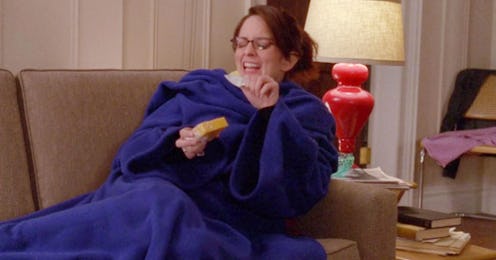Life
That Night Cheese Might Not Be Such A Good Idea

Everyone knows that a bedtime bowl of ice cream or bag of chips isn't doing your health any favors, but those midnight munchies may be even worse than you thought. Late-night snacking is linked with poor memory, a new study shows. The ill effects of off-hours food aren't just related to the fact that people tend to eat out of boredom instead of hunger at these times, and that they make poor food choices. Instead, eating at the "wrong" times of day seems to have negative health effects all on its own.
Researchers from UCLA's school of medicine conducted an experiment that challenges this commonsense wisdom about why weirdly timed snacks are bad. Using mice who were fed either at normal daytime hours or during their usual sleeping times, they discovered that the off-hours mice were much worse at performing a memory recall task, with worse long-term memory as well. The channels of nerves that need to be strengthened in the brain to store memories effectively were activated less strongly in sleeptime eaters than daytime eaters. Researchers also noticed a deficiency in a certain memory-enhancing and Alzheimer's disease-protective protein in the sleeptime eating mice.
In addition to reduced memory, eating at night also scrambled the schedules of the mice, because other aspects of their circadian rhythms were unaffected by the nighttime eating. Their sleep became fragmented, instead of falling neatly into a new day and night pattern that reflected the nighttime eating as the new "day."
Although these results have yet to be replicated in humans, they bode poorly for the status of the much-loved bedtime snack. For children who eat a bedtime snack, it may be at only 8 p.m. or so, which isn't too deeply into the evening. But adults often eat a bedtime snack at 10 p.m., or even later — hours your body should definitely be registering as night. The mixed signal you send with a snack (even a healthy snack) could be causing you to sleep less well, and remember things less well than you otherwise would. This may also explain why shift workers show cognitive impairment (their "lunches" could be at 2 a.m.).
As the science of sleep develops further, I'm amazed that anyone sleeps as well as they do, because so many of our habits run contrary to the evidence. Sleeping in has been shown to really screw up your health, yet we all do it anyway. And, sleeping too much can be just as bad as sleeping too little. There are plenty of ways to hack your sleep, but forming new habits is very difficult. I guess if it ain't broke, don't fix it, but if you can manage to stay out of the kitchen after dinner, that'd be great too.
Image: NBC; Giphy